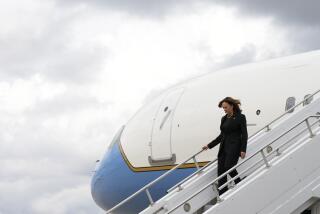A Privilege for Secret Service Subverts Justice
- Share via
The Clinton administration would like to invent a new Secret Service privilege to allow the president to continue to feel comfortable around his bodyguards. The new privilege is appealing at one level, but raises many troubling questions. If the president is protected from potentially adverse testimony, then we will no longer be able to say that in America, no man is above the law.
The fact that a Secret Service privilege has never been asserted before does not necessarily mean that the concept is indefensible or unreasonable. Recently, for example, the Supreme Court created a brand new privilege absolving psychotherapists from having to testify against their patients. The public interest might be harmed if a president’s worrying about the possibility that his Secret Service agents might testify against him in a criminal case prompted him to keep the agents at a distance. But presidents are unlikely to engage in dubious acts around the Secret Service in any event. The likelihood that agents would be called to testify against a president is small, and the public’s interest in criminal investigations is great.
Moreover, the Secret Service is not the type of private bodyguard that owes the president unswerving personal allegiance. Rather, it is a public agency of law enforcement officers dedicated to protecting the life and physical safety of the nation’s commander in chief. The president has taken an oath of office to observe the Constitution and faithfully execute the country’s laws. If he has information or evidence that laws have been broken, he has a duty to cooperate with federal law enforcement authorities. Secret Service agents have the same duty. If the president’s wife and personal secretary can testify to the grand jury, the uniformed agent standing outside the president’s office door ought to as well.
Consider other recognized privileges like the attorney-client privilege, priest-penitent privilege and even the new psychotherapist’s privilege. These are privileges that exist for the protection of the client, the penitent, the patient. They do not exist for the protection of the professional advocate or counselor who serves them. President Clinton has taken “no position” on this new Secret Service privilege, according to his press secretary, Mike McCurry. That is odd since he is the beneficiary of the privilege.
Clinton’s silence on the issue is complicated by former President Bush’s recent letter supporting the right of Secret Service agents not to testify against the president. In 1992, however, Bush confronted a similar situation and reached a different conclusion. Then, President Bush was faced with allegations about his participation in the “October Surprise,” which involved rumors that he had been in Paris before the 1988 presidential election negotiating with Iran for the release of American hostages. The allegations were untrue, and Bush authorized Secret Service agents to testify as to his precise whereabouts during the relevant period. Since the relevant principle could not possibly be that agents only testify when their evidence would be exculpatory, the Bush precedent supports the proposition that Secret Service agents should provide evidence when there are questions about the president’s conduct.
There are other precedents for such testimony: President Nixon’s Secret Service agents testified about the Oval Office taping system during Watergate, and Clinton’s Secret Service agents testified about White House access records during “Filegate” as well as about removal of documents from Vince Foster’s office. Indeed, the effort to cloak Clinton’s security detail with a new dome of silence stands in stunning contrast to President Reagan’s complete waiver of any and all privileges during the Iran-Contra criminal and congressional investigations.
A president cannot be protected from legal or political accountability by hiding behind his bodyguards. The public interest in protecting the president’s physical safety can be assured by specifically excluding information that genuinely concerns national security or the security methods and protective techniques used by the Secret Service. Finally, if a “protective” privilege exists, it benefits the president and only he can invoke it. In this case, Clinton should waive all applicable privileges--as Reagan did during Iran-Contra--and allow the Secret Service to testify.
More to Read
Sign up for Essential California
The most important California stories and recommendations in your inbox every morning.
You may occasionally receive promotional content from the Los Angeles Times.










